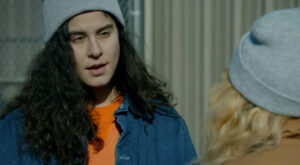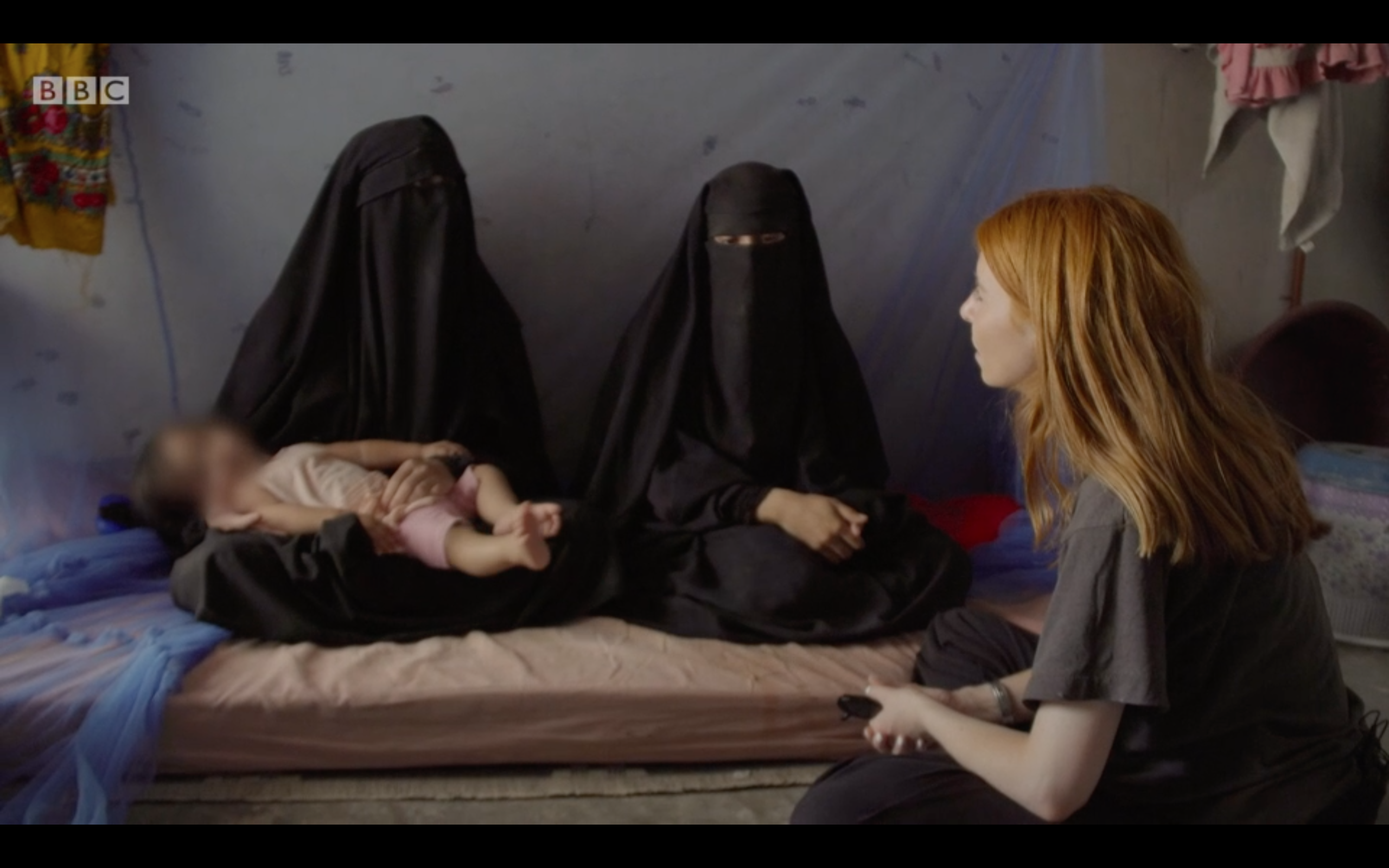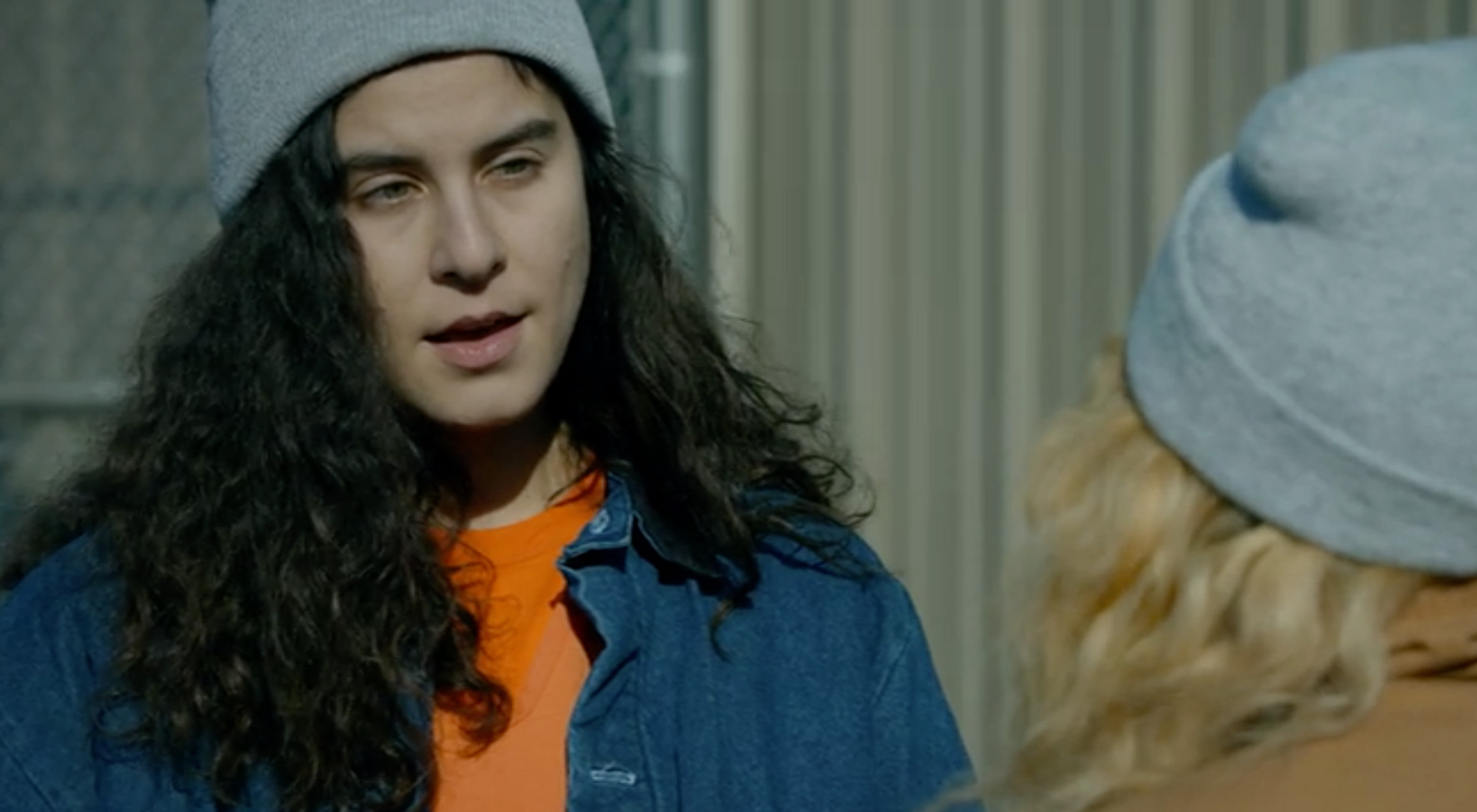Reader beware, spoilers be there
 For a show with a long history of giving space, nuance and complexity to marginalised voices, the latest season of Orange Is the New Black (OITNB) continues the seemingly well-intentioned, but often flat portrayal of Muslims.
For a show with a long history of giving space, nuance and complexity to marginalised voices, the latest season of Orange Is the New Black (OITNB) continues the seemingly well-intentioned, but often flat portrayal of Muslims.
We first meet Shani Abboud at an ICE detention facility located on the same premises as Lichfield maximum security prison. She fled her home in Egypt after her family discovered that she is a lesbian, and in the penultimate episode, she is deported.
Shani is a tangential character, whose story is told in brief snapshots across three episodes. Yet in these short bursts, we learn that her family put her through female genital mutilation as a child, and warned her that she could be killed for bringing shame to her family.
“It’s part of our culture. I didn’t know I was different until I came here. And I heard the words. Female genital mutilation.”
Eighty-seven percent of women aged 15-49 in Egypt have undergone FGM. It is without doubt a common and brutal problem, and one that should be challenged on any platform. But what OITNB lacks, is nuance. Why was a Lebanese actress – Marie-Lou Nahhas – cast as an Egyptian? It seems to be in order to shoehorn in as many Muslim- and Arab- centric social ills as possible. FGM: check, honour killings: check, homophobia: check.
If Nahhas had been cast as a Lebanese character, the creators would have been hard-pressed to push any of these themes into season seven. And that seems to be the point.
Rushed complexity
However well-intentioned the writing may have been, it rushed huge, complex topics into short bursts of dialogue that write off FGM as just part of that barbaric Egyptian culture, rather than a brutal experience that is perpetuated because of patriarchy and a lack of sexual education and awareness. It describes Shani not knowing that FGM is unusual, despite the fact that her family is middle-class, she hangs out at hotels, and has access to the internet. It ignores the fact that FGM is illegal, and that Egyptian activists have been fighting against it for decades; instead the show divides Egyptians into the enlightened-now-that-she’s-in-America Shani, and those in Egypt who are all as backwards as each other.
Shani’s family discovers that she is a lesbian and we presume she subsequently left Egypt for America. So far, a bit far-stretched, (they’re far more likely to suggest she gets married than to kick her out) but believable.
Not satisfied with the drama in this, however, OITNB decided to pile on the threat of an ‘honour’ killing for good measure. Shani’s father tells her, “You know I could never hurt you, but I can’t say the same for the rest of the family.” Killing women for the supposed shame they’ve brought their family is an act that should be condemned – but this isn’t achieved in the brief dialogue we see in the OITNB? What is achieved, however, is the reinforcement of the stereotype that Arabs are violent, irrational and intolerant.
ICE – and Arabs – are brutal
Season seven of OITNB offers a stellar, poignant and impactful commentary of the brutality of immigration systems. It profiles the trial of children and babies, the abuse of power of immigration officials, and the dehumanisation of detainees.
We see this represented from the perspective of different characters: a mother – and a legal whizz – fighting to be reunited with her deported children; a beloved, American-Latina we’ve known since season one ending up at a detention centre because she hasn’t got her ID; a woman who was tricked into early release in order to be deported; a woman who is denied a translator and refused an abortion for a pregnancy from rape.
Every single detention centre storyline serves to highlight the brutality of the ICE facility, all except Shani’s. She has a valid asylum claim, but still ICE deports her. Instead, we focus on the brutality of her family and the backwardness of Egyptians, without any space given for complete context.
Why, in only her case, are multiple complex cultural issues piled on, when the same is not done for other, non-Arab characters? Why could she not simply have been a queer woman seeking asylum in a system that treats her as less than human? What was the point in subjecting this character to FGM and the threat of an ‘honour’ killing if we are not trying to educate, or understand, or improve the situation?
And before you say that this is a television (well, Netflix) drama, so what should I expect, OITNB has pioneered social activism through entertainment. In its seven seasons, it has centred the Black Lives Matter movement, the dehumanisation of incarceration, LGBTQ rights, racism and police brutality. Each has been handled with nuance, sensitivity and a moral narrative that – whether intentional or not – helped viewers to understand, and empathise with, marginalised communities.
Regurgitated misrepresentations
But the show’s representation of Muslims has always been disappointing, preferring to prioritise the drama of our social and cultural ills, over understanding us. In season four we meet hijabi Alison Abdullah who faces Islamophobic microaggressions from fellow inmates, a demonization that never feels resolved – unless resolution looks like making friends, despite being Muslim.
More troublingly, in season five, we discover that Alison encouraged her husband to get a second wife – polygamy is rare and discouraged practice in Islam, and women encouraging their husbands to marry again is all but non-existent. Alison is serious, she doesn’t joke, and, while likeable, she isn’t relatable. In earlier seasons, we learn about Janae Watson, a track star who was raised in the Nation of Islam, but whose father disapproved of her athletic uniform.
The representation of Muslims in OITNB is restricted to the same dichotomy of the worst offenders of entertainment Islamophobia. Either Muslim women in need of saving from barbaric, abusive or controlling homes, (and once they are, they are freer, happier and more enlightened) or they are dull, lacklustre hijabis who encourage our husbands to get another wife (which, no surprise, doesn’t work out well for us). This is reckless misrepresentation which perpetuates the misunderstanding and marginalisation of Muslims.
Make shows that feature FGM, ‘honour’ killings or controlling and unaccepting families, absolutely, but this should not be all we see about Muslims. Even on a show with nuance, heart and diversity, Muslim women are only ever worth profiling for their otherness.
1/5
While Orange Is the New Black touches upon multiple topics that would be considered infractions, its offences are not as severe or explicit as its contemporaries, so it receives one bloodied sword for perceiving itself to be nuanced, but failing in this representation.



